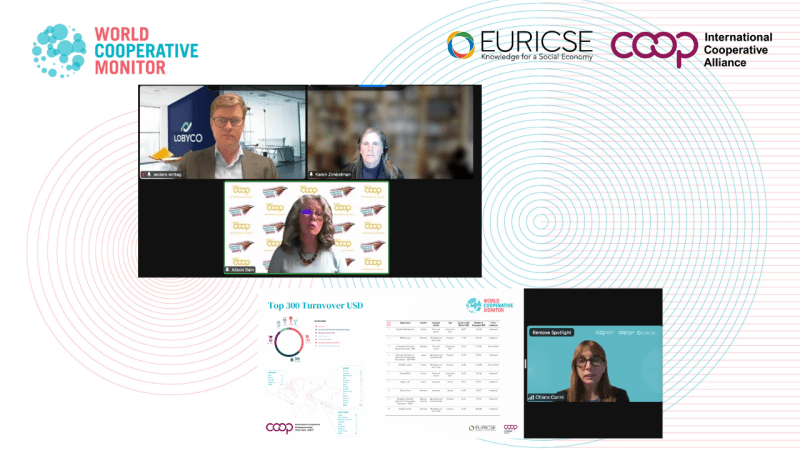
The main findings of the 2022 edition of the World Cooperative Monitor were presented during the ICETT webinar on digitalisation and cooperative identity on 1 December.
In its 11th edition, the Monitor is produced by the International Cooperative Alliance with the scientific and technical support of the European Research Institute on Cooperative and Social Enterprises (Euricse).
The webinar featured a wide range of speakers from practitioners, researchers and cooperative leaders and was followed by more than 200 people from all over the world.
ICA Director General Bruno Roelants highlighted that the Monitor showed that cooperatives are leading economies of scale while being democratically owned enterprises. He argued there is a big potential to develop specific themes every year in which larger cooperative and cooperative groups can share their own experience.
Gianluca Salvatori, Secretary General of Euricse, explained that the Monitor had been created to address a knowledge deficit and prove the cooperative model could lead to large-scale enterprises that are “solid, growing, not disappearing overnight”.
Mr Salvatori believes the Monitor continues to play an important role in raising public awareness about the contribution of the cooperative model at a time when “there is growing acceptance of the idea that we need to think about the economy differently.” He added that the Monitor was “not just an accounting exercise” and seeks to show how some of these large cooperatives are responding to global issues affecting them, such as the Covid-19.
This year’s edition includes a chapter on the challenges and opportunities brought by digitalisation, based on a survey carried out by the ICA’s International Cooperative Entrepreneurship Think Tank (ICETT), in which cooperatives from 27 countries took part.
Dr Saji Gopinath, Vice Chancellor Kerala Digital University, provided an overview of how the pandemic had accelerated digitisation. He added that digitisation can improve value chain activities and help to bring a new approach to the gig economy and increase member engagement and democratisation. “Digitisation can lead to the marginalisation of some people – digital start-ups and co-ops are helping to address this”, he said.
Alison Bain, Chief Marketing Officer at the Midcounties Cooperative in the UK, described some of the initiatives undertaken by her cooperative as part of a member transformation journey. These included adopting a mobile first approach, rather than being over reliant on paper and launching a members’ app and digital card. Over 122,000 users access the app every week, with 102,000 ner members joining the society since the changes were implemented, 16% of them under the age of 30. The embrace of digital has also helped the society save 24 tons of paper every year.
A similar route was adopted by Coop Denmark. Anders Mittag, the Head of Loyalty Programme, Digital Channels & Digital Business at Loybco. The retailer, which enjoys a 30% market share in Denmark, launched a digital loyalty platform in 2016. Over three million customers use the Coop Denmark App, which also acts as an engagement tool by offering members treats and coupons. Other digital products include a CO2 footprint calculator, which enables consumers to track their emissions and see which products have the most carbon footprint.
Chiara Carini, Senior Researcher at Euricse presented some of the key findings of the Monitor. Based on 2020 financial data, the latest edition features the Top 300 ranking based on turnover in which the first position is taken by Groupe Crédit Agricole from France ($88.97bn), followed by retailer REWE Group from Germany ($77.93bn) and the Cooperative Financial Network from Germany (BVR) (US$58.02bn), agricultural co-op Zen-Noh from Japan (US$57.69bn) and ACDLEC Leclerc from France (US$54.83bn).
In the ranking based on the ratio of turnover over gross domestic product (GDP) per capita, the top cooperative is the Indian Farmers Fertiliser Cooperative Limited (Iffco) from India. Iffco is followed by the Gujarat Cooperative Milk Marketing Federation Limited, financial co-op Groupe Crédit Agricole, healthcare co-op Sistema Unimed from Brazil and REWE Group from Germany.
Going forward, the ICA and Euricse will focus on collecting more and different data.
“We cannot just show that cooperatives exist and can be large and effective. We need to improve quality and quantity to capture the contribution of cooperatives to the big challenges,” said Mr Salvatori. Mr Roelants also called on national apexes to help elevate the Monitor even more by collecting and sharing more data.
The full report is available here.
Watch the webinar here.
Read the Press Release here.




